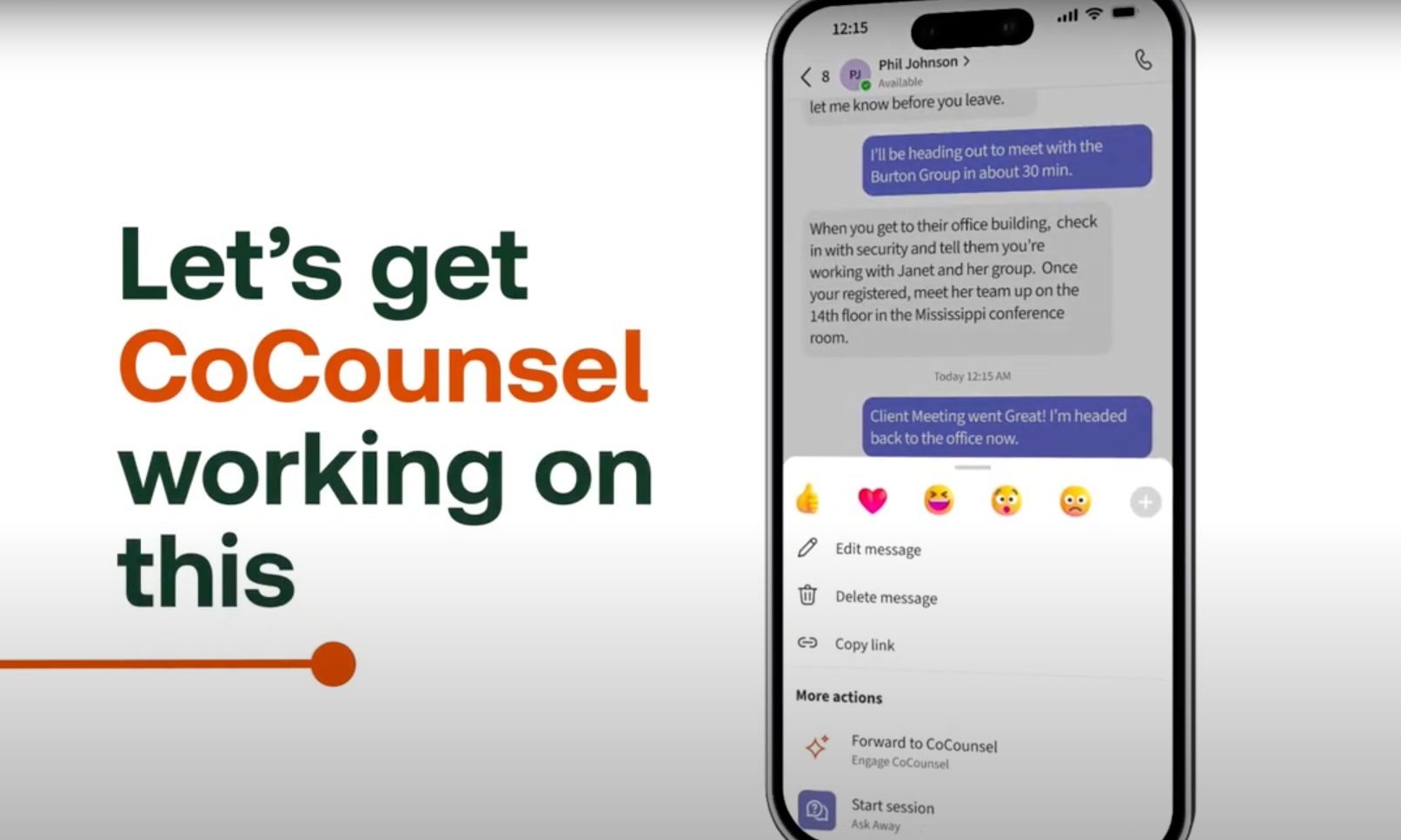AI in Action: How Addleshaw Goddard Uses CoCounsel Core to Increase Efficiencies

Thomson Reuters recently rolled out CoCounsel Core – the only professional-grade generative AI assistant built specifically for the practice of law – in the UK. Among the leading UK law firms using CoCounsel Core’s suite of tools is Addleshaw Goddard LLP, which employs more the 1,600 lawyers in 19 offices worldwide.
Steve Assie, general manager of Global Large Law Firms, Legal Professionals, Thomson Reuters, recently talked with Kerry Westland, partner and head of the Innovation Group at Addleshaw Goddard, about how CoCounsel Core supports the firm’s AI strategy. Below are highlights of their conversation on how AI is empowering lawyers and helping them deliver work to clients more efficiently.
Assie: Addleshaw Goddard is recognized as a technology leader in the legal space, and you’ve invested time and financial resources toward experimenting on how to best use generative AI in the practice of law. How is using CoCounsel Core supporting your firm’s overall AI strategy?
Westland: “Our overall AI strategy is split between using tools like CoCounsel and working with vendors in the market to bring in best-in-class tools and developing our own bespoke solutions leveraging our internal teams. This gives us a balance between immediate access to working products and building out more tailored solutions that can be applied to specific niches within AG. CoCounsel has given us the ability to process large numbers of documents using generative AI to give us outputs and reports that previously required a significant amount of manual work to create from other tech tool outputs. This has enabled us to immediately start using CoCounsel on matters within the firm where document diligence is required, as well as looking at potential use cases that were previously not possible within time and budget constraints. The use of this tool supports our strategy to deliver excellent legal services to our clients, with an underpinning of new and innovative technology and process.”

Steve Assie, general manager of Global Large Law Firms for the Legal segment of Thomson Reuters
Assie: Your firm is working with clients to establish use cases around generative AI. Can you share some use cases and, specifically, how you’re using CoCounsel Core to deliver work to clients more efficiently?
Westland: “Generative AI’s flexibility opens up a myriad of opportunities. We’re constantly uncovering new applications for this technology, with CoCounsel proving to be useful for extensive document analysis, such as during a due diligence process. For instance, in a recent project, we tackled a comprehensive review of Property Agreements in relation to the Controlled Land Order (CLO), ensuring they adhered to specific regulatory requirements and did not contain language that might suggest anti-competitive practices.
The challenge with the CLO is that there is a very broad definition of anti-competitive, which includes a range of different restrictions, not just overt statements that prevent certain actions. This task was something we have delivered previously, spending time training machine-learning tools to extract specific provisions and doing a manual ‘catch all’ review. CoCounsel allows us to ask a series of questions using natural language across a large document set, meaning that we could turn the CLO into a specific series of questions and prompts and run these requirements across the documents, with no pre-training needed. This tool means we can get an initial review of risks and issues immediately, that then signpost whether there are potential breaches of the CLO.
The role of the lawyer remains crucial, as they breakdown the regulations and determine the necessary information, formulate the relevant questions and then critically assess the output. This approach not only accelerates the information gathering process, putting all relevant documents at our fingertips for review under a uniform set of criteria but also significantly increases our efficiency, allowing us to focus on more nuanced aspects of the review.”
Assie: Generative AI is poised to play a transformative role in the legal sector. What impact will CoCounsel Core make by empowering lawyers with their own generative AI legal assistant?

Kerry Westland, partner and head of the Innovation Group, Addleshaw Goddard
Westland: “Giving lawyers access to AI legal assistants through tools like CoCounsel allows us to enable individuals to directly engage with technology and see the potential. Currently our Innovation team is spending a lot of time with lawyers using generative AI tools, but as confidence across the firm rises and we develop more bespoke and personal tools, we will see much more direct usage by individuals on a day-to-day basis. Lawyers all work in their own way, so a one-size-fits-all approach to generative AI does not work. The flexibility offered by this technology means that teams across all of our groups can make use of it. We are just making sure we do the work to set out those use cases and get them started. Better access to knowledge within the wider Thomson Reuters offering and embedding this into lawyers’ workflows will be important and a tool like CoCounsel will be enabling us to do this.”
Assie: What’s the most exciting part about CoCounsel Core for Addleshaw Goddard?
Westland: “CoCounsel has unlocked some of the use cases we have been pushing for a number of years. The ability to jump straight in and query a set of documents without any training means we can do initial checks in no time at all. The future plans around integrations with other systems such as HighQ, Practical Law and Microsoft Copilot are exciting as we work with these every day. The ability to build out end-to-end solutions has always been our goal and adding a generative AI tool to this helps us continue building out solutions to deliver on legal work.”
Assie: What’s the one thing you want legal professionals to know about using CoCounsel Core?
Westland: “That it can be used within a law firm environment. We have spent considerable amounts of time on both the security checks and the training needed to get our lawyers to understand how to use these tools properly. Safety of clients’ data is crucial for all law firms. New tools in the market always come with risks around maturity and security, and generative AI adds another layer. We get many questions as to whether data is retained for training models, where data is processed and stored and so on. This can easily discourage people with testing generative AI. There is no better way to learn the capabilities of this technology than by getting hands on and trying these tools out. Testing CoCounsel allowed us to ensure it checked all of these boxes before using the generative AI assistant with our clients.”